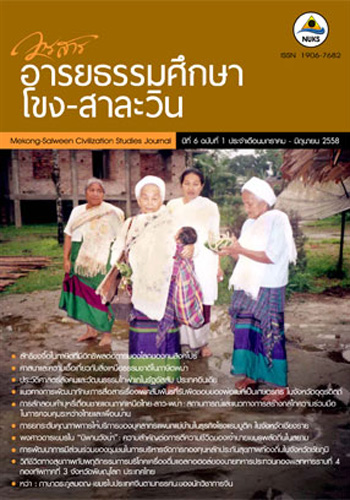พงศาวดารเขมรใน “นิพานวังน่า:” ความสำคัญต่อการตีความชีวิตของเจ้านายเขมรพลัดถิ่นในสยาม
Main Article Content
Abstract
“นิพานวังน่า” เป็นพระนิพนธ์ของพระองค์เจ้าหญิงกัมพุชฉัตร พระธิดาในสมเด็จกรมพระราชวังบวรมหาสุรสิงหนาท (วังหน้า) กับนักองค์อี พระธิดาในกษัตริย์เขมรที่ทรงลี้ภัยการเมือง เข้ามาพึ่งพระบรมโพธิสมภารในรัชกาลที่ 1 แม้วรรณกรรมเรื่องนี้จะเน้นพรรณนาความเศร้าโศกอันเนื่องมาจากการทิวงคตของพระบิดาของกวี แต่ถึงกระนั้นก็ยังพบพงศาวดารเขมรที่ดูราวกับไม่มีความเกี่ยวข้องกันแทรกเอาไว้ด้วย บทความนี้มุ่งศึกษาความสำคัญของการปรากฏอยู่ของพงศาวดารเขมรใน “นิพานวังน่า” และความสำคัญของตัวบทนี้ที่มีต่อการตีความชีวิตของเจ้านายเขมรพลัดถิ่นในสยาม ผลการศึกษาพบว่า พงศาวดารเขมรใน “นิพานวังน่า” ซึ่งเป็นเรื่องที่รับรู้กันดีในหมู่เชื้อพระวงศ์เขมร มีความสำคัญในฐานะเครื่องมือทางวัฒนธรรมที่ใช้สื่อ “สาร” สำคัญคือ กษัตริย์เขมรในอดีตได้ทรงกระทำผิดมหันต์จนต้องทรงถูกสาป คำสาปนี้มีผลเกี่ยวพันถึงเชื้อพระวงศ์เขมรในสมัยต่อมา ซึ่งต้องทรงรับผลกรรมที่บรรพบุรุษได้ทรงก่อไว้ คำอธิบายดังกล่าวอาจมีส่วนช่วยในการตีความเพื่อทำความเข้าใจชีวิตของเจ้านายเขมรพลัดถิ่นในสยามว่า เพราะเหตุใดเจ้านายเขมรเหล่านี้จึงทรงมีชีวิตระหกระเหิน พลัดแผ่นดิน และเป็นทุกข์แสนสาหัสอย่างหลีกเลี่ยงไม่ได้ อย่างไรก็ดี ถึงแม้จะดูเหมือนว่าชีวิตของเจ้านายเขมรพลัดถิ่นจะถูกกำหนดเอาไว้แล้ว แต่การที่บุคคลเหล่านี้เชื่อเรื่องราวในพงศาวดาร ประกอบกับการเชื่อเรื่องกฎแห่งกรรมในพระพุทธศาสนา ก็เป็นปัจจัยสำคัญที่ช่วยชี้แนะทางออกแก่ชีวิตว่า พระองค์ควรจะทรงประพฤติตนเช่นไร เพื่อมิให้ต้องทรงพบกับโศกนาฏกรรมในชีวิตเฉกเช่นเดียวกับบรรพบุรุษของพระองค์
Khmer Chronicle in “Niphan Wang Na:” Its Significance for the Interpretation of Diasporic Khmer Royalty’s Life in Siam
“Niphan Wang Na” is a piece of literature composed by Princess Kampushchat born of Maha Sura Singhanat (King Rama I’s ‘Front Palace’) and his diasporic Khmer princess concubine, Ang E, who had fled with her relatives into Siam Kingdom, because of political reason, at the early period of King Rama I’s reign. Even though the literature mainly portrays the sorrow at the death of the author’s father, Khmer chronicle, seemingly irrelevant, was significantly inserted in it. This paper aims at examining the significance of the chronicle’s existence and its significance for the interpretation of diasporic Khmer royalties’ lives in Siam. The study reveals that the chronicle, supposedly well-known among Khmer royal kin, functions as a cultural device to implicitly present the meaningful message that a mythical ancestral Khmer king had committed seriously unforgivable misconduct, consequently, he was cursed. The curse also affected his descendants. Therefore, this chronicle may also help interpret why some Khmer royalties, such as Ang E, had to stray, abandoned their palace, and tremendously suffered in their lives. Even though the chronicle seemed to indisputably predestine diasporic Khmer royalties’ lives, their strong belief in the chronicle’s content and in Buddhism’s Karmic law, convinced and guided them how to behave in order not to reach the tragic life as their ancestor did.


